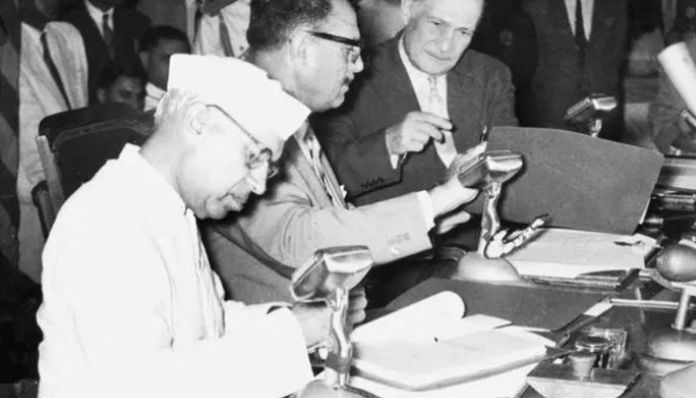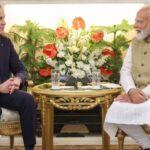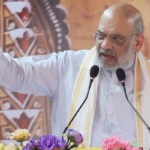Independent India’s first Prime Minister Jawaharlal Nehru will be remembered forever, among other things, for the countless blunders he made during his tenure. His blunders continue to harm and haunt India to this day. One such blunder was the signing of the Indus Waters Treaty in 1960.
As Prime Minister Narendra Modi said in his Indepenedence Day speech from the ramparts of the Red Fort, the now-scrapped Indus Waters Treaty signed between India and Pakistan, was “unjust and one-sided” as it inflicted monumental harm to the Indian farmers while benefitting the Pakistanis. Notably, just five years later, Pakistan waged a war against India, only to lose though.
However, not only the terms of the treaty were unjust, Prime Minister Nehru agreeing to it was against the will of the India and its parliament.
The Indus Waters Treaty was signed in Karachi on 19th September 1960. The issue was then brought up for debate in the Indian parliament on 30th November 1960. With most of the MPs, even those from Congress, against this treaty for its provisions favouring Pakistan in a one-sided manner.
The parliamentary debate on IWT was held a month after its signing. This debate was allotted a two hours time. Yes, for a treaty signed without taking the elected representatives of the country into confidence, the treaty that essentially decided the destiny of Indian farmers, the treaty that decided India’s control or a lack of it on its own waters, mere two hours were allotted for discussion. PM Nehru did not even care to take the parliament or opposition leaders into confidence before relinquishing India’s control over its own precious rivers and signing the Indus Water Treaty which was no less than a second partition.
Back then, Atal Vihari Vajpayee, the MP from Balrampur, launched a scathing and unforgettable attack on PM Nehru, calling the Indus Waters Treaty a dangerous concession to Pakistan.
Vajpayee drew attention to the fact that the government had previously declared that water would be cut off to Pakistan by 1962, but was now granting permanent rights. Vajpayee declared, “This treaty is wrong, or that announcement was wrong.”

Vajpayee cited Pakistani President Ayub Khan as saying that India had agreed to share river control: Vajpayee cautioned, “Joint control comprehends joint possession. When such agreements are made, Parliament is not taken into confidence,” he stated.
Similarly, Pali MP Harish Chandra Mathur had also fiercely criticised Nehru’s blunder calling the Indus Waters Treaty was “all to the disadvantage of this country.”
“…unfortunately, the facts of the case as they are before us give us an inevitable feeling that this treaty is all to the disadvantage of this country. It is all to the advantage of Pakistan. I shall convey through you (speaker) to the Government that the general feeling, at least in my part of the country, particularly in Rajasthan, is that Rajasthan has been very badly let down in this treaty. Not only that. I think I am quite right when I say that this is the general feeling all over the country. If you were to look at the newspaper comments, you will find that when facts of the treaty were made known to this country, all the leading newspapers of this country made adverse comments,” Mathur said.

He further read out the headlines of the leading newspapers which aptly captured the unfairness of the Indus Waters Treaty and nation’s anger over the same. He issued a warning that his home state of Rajasthan will suffer ongoing annual losses of Rs 70–80 crore as a result of five million acre-feet of lost water.

“There is another point where we are severely affected. Through the treaty we are losing 5 million acre-feet of water. There is such a great potential in Rajasthan. Let the Minister deny that we cannot possibly draw 5 million acre-feet of water from Chenab and that will not help the country perpetually. This will mean another perpetual loss to the country to the extent of about Rs. 70 crore to Rs. 80 crores per year. This is the implication of this treaty,” Mathur told the Parliament.
MP Mathur went on to say that India had surrendered step by step since 1948, and while Pakistan kept raising its demands, India yielded under pressure.
“I could have understood all these sacrifices if we had, through this treaty, solved also the Kashmir problem. The only trouble about Kashmir was, because the rivers flow from Kashmir and through this country, Pakistan was in a difficult position. So, if they are assured of water, Kashmir should cease to be a problem,” Mathur said, criticising Nehru for not linking the water settlement to the treaty. “Is Kashmir no longer a problem?” he questioned.

Congress MP Ashok Mehta also sharply criticised Prime Minister Nehru. In his historic speech in the parliament, Ashok Mehta equated the World Bank-mediated Indus Waters Treaty to India’s “second paritition”.
Calling this treaty a second paritition at that time was significant as the wounds of partition and Pakistan’s betrayal in 1948 were fresh, however, Nehru failed to read through the deceit of Pakistan.
“We are reopening all the wounds of 1947…this is being done again with the signature of our Prime Minister,” Mehta said, adding that after 12 years of talks, India had settled on terms “which cannot be justified as fair”.

Mehta stated that, in contrast to the previous 75:25 proposal, the treaty handed Pakistan 80% of the waters and India only 20%.
“Now we are faced with this new problem that the Kashmir dispute, instead of getting settled, instead of the solution of the canal waters problem leading us, helping Us towards the easing of the tentions in that area, have really aggravated the situation,” he said and also expressed surprise over the absence of PM Nehru in the parliament.
Meanwhile, MP AC Guha also highlighted the economic aspects of the historical mistake Nehru travelled all the way to Karachi to make. Guha said that India had 26 million acres in the Indus basin, however, only 19% irrigated, while Pakistan’s 39 million acres were 54% irrigated.

“By land share, India should have received 40% of waters. Instead, it got only 20%. Pakistan received Rs 400+ crore in grants, India just Rs 27 crore in loans,” Guha said. He added that “the more regrettable thing is that waters which India would need badly would be allowed to flow into the sea unutilised and yet we shall be denied the opportunity of developing our own land with that water,” the Congress MP said.
K.T.K. Tangamani, the Communist party MP, raised question over why the parliament was not run till 9th September 1960 so that the MPs could be taken into confidence as the treaty was signed on 19th September.

“I would like to say that the Parliament here was in session till the 9th September, 1960. This treaty was entered into on the 19th September, 1960. Surely, it would have been possible for Government to place before us at least the main purport of this treaty. They could have at least indicated certain provisions and taken into confidence the State Goverrunents concerned, and also the Members of this House as to how it is going to affect us. Assuming that this House could not be taken into confidence, at least, the leaders of the recognised all-India parties could have been consulted, before such a treaty was entered into. I do not say that the Government of India have no right to enter into a treaty with a foreign country and ratify it even without referring it to Parliament. But I submit that in future, the practice that I have suggested would be a very salutary one,” he said.
Jawaharlal Nehru’s unconvincing and nonchalant defence of the Indus Waters Treaty
At last, Prime Minister Nehru rose to address the parliament. Nehru, though sounded depressed, yet was resolute in calling the Indus Waters Treaty a “good treaty for India”.
Nehru defended his decision of not consulting the parliament or taking the MPs into confidence before signing the Indus Waters Treaty, let alone expressing any remorse over the blunder that he made. He essentially said that he does not need to take parliament’s permission before signing such complicated agreements.
“About this argument about consulting Parliament at every step; I should like the House to consider what that means and what that would lead to. I do not think it is possible for any kind of these complicated agreements to be dealt with, when we have to refer to Parliament. There must have been, I suppose, in this particular matter, dozens of approaches, dozens of plans, discussed, ultimately rejected and something happened. Are we to come at every step and ask Parliament?” Nehru asked.
He dismissed the “second partition” argument made by the MPs and called it “loose, meaningless language”. PM Nehru went on to ask a audacious question “Partition of what? A pailful of water?”

“Coming to the actual merits of this, I confess that, reading the notes my colleagues took about the points raised, I have a feeling of extreme depression that any honourable or respected Member of this House should say what has been said. It represents a complete absence of any perspective approach to this problem, any future approach Or any benefits as a whole which we derive. It represents an exceedingly narrow-minded approach which may, perhaps, injure the other party, but certainly would injure our own interests also at the same time. In such matters, there has to be give and take,” Nehru said,
“One honourable Member said, this is the second partition of India. I stand amazed and astounded that anybody should Use such loose language, which has no meaning, which is really a perversion of the facts. Partition of what? Of an inch of territory? Partition of a pailful of water?” he continued.
As if these outrageous remarks were not enough, PM Nehru went on to defend the Rs 80 crore per year payments to Pakistan.
“We have given a crore or two more or some money more. You may say that we have allowed them water for another two or three years, which we should not have allowed. Those are presumably the two main things. How, I should like to know, is this House now to judge of the quantum of supply of water or the quantum of money to be given. I confess I cannot judge it off hand. Of course, I can say that Rs. 70 crores is less than Rs. 80 crores. That is a question of arithmetic and one could say: If I could give Rs. 70 crores why should I give Rs. 80 crores, whatever the figure might be. But about the relative rightness of the figure, nobody can say. When you deal in this matter it is a balance struck after a hundred factors are taken into consideration; it is a balance struck after ten year of long and bitter argument. Something is done because it is considered, in the balance, that is desirable,” Nehru said.
PM Nehru claimed to have purchased peace, and even boasted that Pakistan had initially demanded Rs 300 crore, however, India had settled for Rs 83 crore. Basically, giving in to Pakistan’s demands and intransigence at a lesser cost was described as an achievement by PM Nehru.

Notably, India paid $174 million ($1.6 billion today) to Pakistan even before the treaty was signed.
The debate ended with no significant result as no voting took place and the treaty was already signed. Nehru left the parliament to meet Japan’s Crown Prince who was on a visit to India. The flow of India’s waters was decided in Pakistan’s favour. A parliamentary debate was held weeks after the IWT’s signing, and yet countless questions remained unanswered.
Indus Waters Treaty: What is was and why the Modi government decided to do away with it?
It all started in 1948, when India temporarily cut off the Indus water to Pakistan but reopened it later. Pakistan, however, approached the United Nations (UN) in 1951, alleging that India had cut off water to numerous Pakistani villages. Eventually, the Indus water agreement was prepared in 1954 by the World Bank based on the recommendations of the United Nations. After years of discussions, India and Pakistan agreed on shared ownership of six rivers. Pakistan was the lower riparian state at the time of India’s independence in 1947, since the border between the two countries was defined across the Indus Basin.
Signed on 19th September 1960 in Karachi, the Indus Water Treaty between India and Pakistan was brokered by the World Bank. This water-sharing agreement governs the use of the Indus River system by India and Pakistan. Signed by Prime Minister Jawaharlal Nehru and Pakistan Field Marshal Ayyub Khan, this treaty allocates the waters of six rivers originating in the Himalayas, broadly divided into two categories: the eastern rivers and the western rivers. The eastern rivers Ravi (origin in Himachal Pradesh), Beas (flows through Himachal Pradesh and Punjab, and Sutlej (originates in Tibet, flows through India into Pakistan) were allocated to India, while Indus, Chenab and Jhelum were allocated to Pakistan.

India effectively utilises the waters of eastern rivers for hydropower, irrigation and other purposes. Meanwhile, Indus, Jhelum and Chenab are essential for Pakistan’s hydropower, irrigation and other needs, with Indus being nothing short of Pakistan’s lifeline.
While the signing of IWT was touted as a historic step towards mutual cooperation and peace, this treaty was not essentially balanced; in fact, it actually benefited Pakistan more due to the higher water flow in its assigned rivers, the western rivers.
Notably, under this arrangement, India controls around 20 per cent of the total water flow, which translates into 33 million acre-feet or 41 billion cubic meters annually, and Pakistan gets 80 per cent, which is approximately 135 million acre-feet or 99 billion cubic meters. This agreement allowed limited non-consumptive uses of the western rivers, such as hydropower generation, however, it restricted blocking or dramatically altering water flow into Pakistan.
In addition, the treaty also gave Pakistan the right to object to the designs of Indian hydropower projects on western rivers. Under the IWT, the commissioners of India and Pakistan are supposed to meet once a year, alternatively in India and Pakistan.
“The Government of India and the Government of Pakistan, being equally desirous of attaining the most complete and satisfactory utilisation of the waters of the Indus system of rivers and recognising the need, therefore, of fixing and delimiting, in a spirit of goodwill and friendship, the rights and obligations of each in relation to the other concerning the use of these waters and of making provision for the settlement, in a cooperative spirit, of all such questions as may hereafter arise in regard to the interpretation or application of the provisions agreed upon herein, have resolved to conclude a Treaty in furtherance of these objectives, and for this purpose have named as their plenipotentiaries…” the Preamble of the Indus Water Treaty reads.
Call it humanitarian grounds or lack of political will, in the last 60 years, India never considered scrapping the Indus Waters Treaty, silently suffered the injustice this treaty did to lakhs of Indians, even as Pakistan continued to inflict one wound after the other on Bharat. From violating the 1972 Shimla Agreement to betraying the 1999 Lahore Declaration, carrying out countless terror attacks on innocent Indian citizens, starting conventional wars only to lose, to attempting to destabilise through proxy wars and cross-border terrorism and internationalise the Kashmir issue while illegally occupying PoJK, Pakistan proved to be a hostile neighbour with its army and governments, regardless of which party is in power.
It took over six decades, the many Islamic jihadist terror attacks sponsored by Pakistan, with the Pahalgam terror attack of April 2025 being the final trigger, and the leadership of Prime Minister Narendra Modi, that the wretched Indus Waters Treaty was relegated to the veritable dustbin it belonged to.
Discontinuing the one-sided ‘Aman ki asha’, the Modi government took a strong stand and decided that blood and water cannot flow together adding that no bilateral talks can be held with Pakistan until it stops sponsoring Jihadi terrorism against India. Pakistani establishment’s support to Islamic terrorism once again in Pahalgam, however, confirms that they are not ready to shun their intransigence.
Pakistan has repeatedly cited the IWT to lay claim over the waters of the Indus river system. Pakistani politicians and its rogue jihadist military leadership continues to threaten to stop India’s breath if the IWT is not restored. Pakistan even approach the international court-of-arbitration to force India into resuming the treaty. But the Modi government remains undeterred even in the face of nuclear attack threats.
This situation, however, had never arose had PM Nehru decided against signing the Indus Waters Treaty on Pakistan’s terms. His Himalayan blunder has been undone by the Modi government for good.













